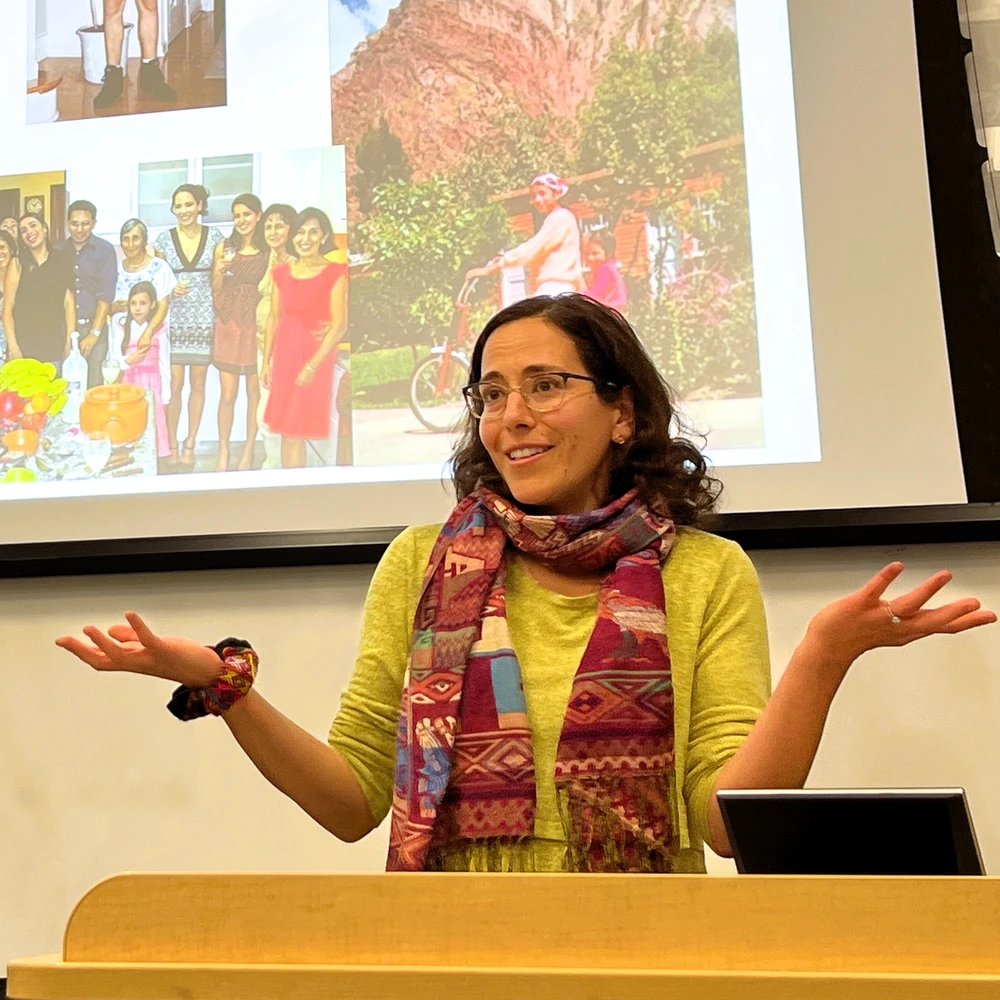
Markita Landry (PhD, ’12) is an associate professor of chemical engineering at the University of California, Berkeley, and a 2024 Blavatnik National Award winner and 2020 University of Illinois Young Alumna Awardee who recently returned to the University of Illinois Urbana-Champaign campus to share her latest research and her educational journey with Illinois students in chemistry and physics.
With degrees from the University of North Carolina in both chemistry and physics, Landry said she chose the Illinois chemistry program to pursue her PhD, because she could earn a doctorate in chemical physics and was impressed by the wide variety of innovative research opportunities.
“I remember visiting here, not really ever having been in the Midwest before, and absolutely loving the culture of UIUC and the breadth of faculty research that was available,” Landry said.
As a graduate student at Illinois, Landry joined the research group of Illinois physics Professor Yann Chemla, whose research group was just getting started. The Chemla lab at Illinois studies mechanical processes in biology. Their work involves optical traps (or “optical tweezers”), which utilize the force generated by focused laser light to manipulate microscopic objects, allowing researchers to follow the trajectories of individual molecules in real time and measure the forces they generate.
“It was really cool to build some of the optical trap setups and understand how they worked before starting on the biophysical experiments,” Landry said.
Her return in early November to the Illinois campus was part of the Department of Chemistry’s celebration of Hispanic/Latinx Heritage Month. Landry talked about her family’s roots in Bolivia and her educational journey that included immigrating to the United States when she was in high school and her growing interest in science and math, partly fueled by her mother’s influence as a scientist.
“And I gravitated towards science and math classes because they made sense, kind of independent of language,” said Landry, who discovered her passion for research as an undergraduate at the University of North Carolina.
“So, I applied to a few graduate programs and not necessarily with the best GPA but with a really strong passion and drive for research,” she said.
While a graduate student at Illinois, Landry contributed to the formation of the University of Illinois chapter of the Society for the Advancement of Chicanos/Hispanics and Native Americans in Science (SACNAS).
With the help of chemistry Prof. Wilfred van der Donk as their adviser, Landry said it was a slow start getting others involved, but the chapter has grown at Illinois.
“One of the things that I've been following since graduating from UIUC is the growth of the SACNAS chapter… It’s just amazing to see how the chapter has grown and flourished since my time here,” said Landry, who graduated in 2012 and went on to be a postdoctoral researcher at MIT.
At MIT, Landry focused on using the single molecule techniques she learned to build as a graduate student at Illinois in the analysis of single nanoparticles in the lab of Michael Serrano.
“While I was at MIT, I built a specific instrument that allowed us to look at the nano bio interface, or the ligand-nano interface, all in vitro with single molecule resolution,” Landry said. “And I made one key discovery in the ability to modulate the fluorescence of specific nanoparticles through ligand binding, which my lab now uses to develop chemical sensors to image brain chemistry.”
It was late in her postdoctoral research, she said, when she realized a lot of the passion and joy she experienced in research was partly exploring science without an economic purpose or end game and partly working with trainees.
“I really enjoyed working collaboratively with people from multiple disciplines. And I felt like academia was the way to fulfill that career,” said Landry, who has enjoyed a fulfilling and distinguished career as a young scientist.
As one of three National Blavatnik Award winners announced in September 2024, Landry was awarded for contributions to the development of neurochemical probes -- tiny tools -- that enable visualization of brain chemistry, and its imbalances in neurodegenerative and psychiatric diseases. Her lab's work in the development of tools to genetically engineer plants was also recognized for this award. This important work is helping to tackle big problems in health and the environment, paving the way for advances in more resilient crops and developing new treatments for neurological disease ranging from Alzheimer’s to autism spectrum disorder.
During her lecture at Illinois, Landry said when tackling tough problems, whether in economics or science or whatever industry, it's almost always better to get multiple opinions that counterbalance the wrongness of each to get to ground truth.
“When it comes to doing science, it’s very easy to get attached to this idea that there must be one perfect way to do things. By surrounding yourself with individuals from different research trainings or different backgrounds and different walks of life with experiences that give them different perspectives is very, very important to doing science in a way that’s effective,” Landry said. “From a demographic standpoint, we also know that science is not necessarily always going to be populated by a collection of individuals that represent, broadly speaking, our demographics. This is problematic from the perspective of biasing our scientific workforce in a way that does not serve the population well. Exclusion is not good. But also, I would argue harms science itself in the sense that we do science best when we have perspectives from just about everywhere.”